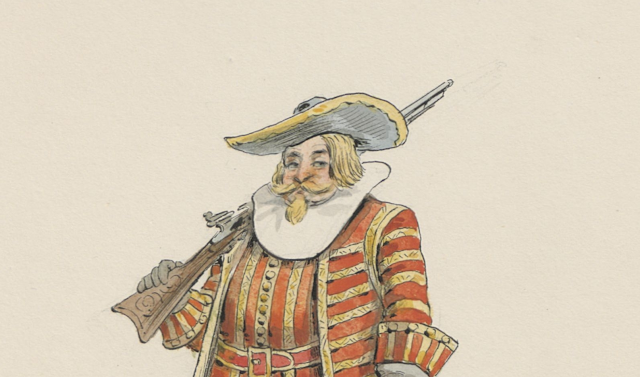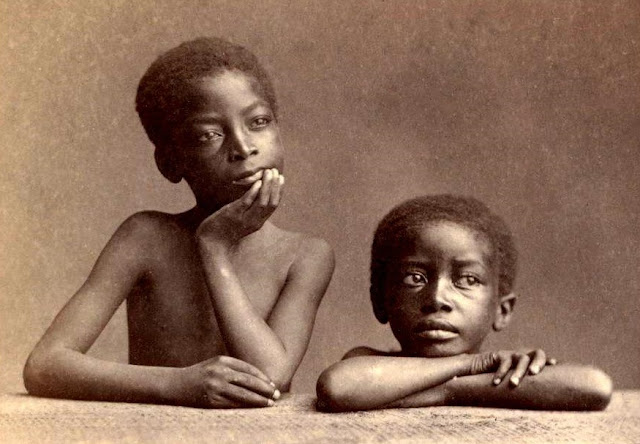White Male Privilege in the Time of "New World" Slavery
White Male Privilege in the Time of "New World" Slavery
Here's a rather comical tale I read recently (at least I found some humor in it).
This story comes to us from Haiti during the time that the island nation was a French colony and most of the population consisted of people who were enslaved by the French. The author is a monk by the name of Jean-Baptiste Labat (1663-1738). It is important to note that Labat was himself a slave-owner and the kind who did not mind whipping his slaves viciously for their "disobedience."
This story demonstrates the stratification of privilege that existed in the time of slavery. It further shows how any White man - no matter their level of intelligence - was able to finesse and finagle their way up the social ladder. In this case, the pathway to wealth was an older White woman and that wealth was built on the backs of African slaves.
The story begins...
 |
| D'Artagnan from The Musketeers, A Drama by Alexandre Dumas and Auguste Maquet (1845) (Source: National Library of France) |
Not long before we arrived in Saint-Domingue, a Gascon [from the region around Bordeaux] gentleman, or a man claiming to be such, took advantage of a woman [in such a way that] the authorities could not intervene.
We were told the story which is too remarkable not to tell it here as it was told to us. I have added nothing to it. [Translator's note: Noblemen from this southwestern region of France were frequently stereotyped for comic or literary purposes as poor, overly-proud, but not very hard-working. Gascons were held to be smooth-talkers, with a distinctive accent. Perhaps the most famous Gascon in French literature that most Americans might know is D'Artagnan, the fourth member of Alexander Dumas' The Three Musketeers, an historical novel written in the 19th century.]This gallant man, whose name I withhold, having heard of the generosity of [the French governor] M. du Casse, came to him, sure that he would do for him what he had done for so many others. M. du Casse, indeed, offered him [a place at] his table and house while he waited for an opportunity to serve him. He told him to see the country and to find something that suited him.
Our gentleman saw a number of planters who had many slaves and since Gascony is more a land of invention than industry, he suggested that M. du Casse encourage each of these large planters to give or lend him a slave. For, he said, the work of their plantations will not be diminished by one less slave, and when I have 50 or 60 I will be able to build a fine plantation and reestablish myself.
M. du Casse, for amusement, proposed this plan to a large party who ate at his house, and, observing that no one was in the mood to subscribe to this scheme, he told the Gascon that he would have to think of something else, nevertheless there was no hurry, for his house was still at his disposal, and he advised him only to choose well, and that, if he was inclined to marry, a gentleman was sure to find substantial advantages in this country.
This gambit pleased the Gascon, he set to work, he searched, he discovered and decided to try his luck. He told M. du Casse that he had found a nest, that perhaps the bird would be difficult to take, but with his protection, he hoped to see it through.
The bird was an old widow from Dieppe who had buried six or seven husbands, and her nest was a prosperous plantation, well furnished with slaves and with all everything that a wealthy person can be admired for. It was between Esterre and Petit Cul-de-Sac.
The Gascon, having made his plans carefully, dressed in his best clothes and rode one of M. du Casse's horses. He arrived at this plantation about dinner time; on the pretext of needing shelter from a bit of rain, he entered and paid his compliments to the old woman in a manner which pleased her all the more since it had been some time since she had heard anything so witty. She had him stay for dinner, as is the custom.
While they were at the table, he did his best to court her and he was happy to notice that these attentions did not displease the old woman. He asked for his horse sometime after they had left the table and, find an excuse to stop by the kitchen, he passed some money to the servants, who were at once at his service.
The old woman noticed that he had forgotten his boots as he mounted his horse (for apparently he had had his boots removed before dinner), she reminded him; but he replied that he had left more than his boots with her and that he feared he might never regain it. The old woman understood what he meant and was pleased. He left and slept under some other pretext at a plantation two leagues from there.
He was sure to return the next day at the same time he had come the day before. The servants, won over by his generosity, hurried to inform their mistress of his arrival and to take his horse; he entered in the same time as the woman and after greeting here:
--Madame, he said, do not think that I came to take what I left here yesterday; it is no longer mine, you will possess it for ever.
The old women, believing or pretending to believe that he was talking about his boots, thanked him and said that this was not her way and immediately told a servant to bring them. But the Gascon told her that this was not about boots, that it was his heart that he had left here, that it was so happy that it didn't appear to want to leave and that, in this case, it was right that he stay where his heart had settled down. He continued to keep at her in this way throughout the meal and afterwards.
As night approached, the old woman told him that his horse would be brought to him whenever he wished.
--He! What for, Madame? he said. My heart will never leave here, it is made for yours, I would be attempting the impossible were I to try to separate them. As a good Frenchman, Madame, he continued, this means that I love you and that I believe that you have too much taste not to reciprocate and become my wife.
To this point the sweet-talk of the Gascon had pleased the old woman, but the word marriage frightened here. She grew serious, she tried to get angry: the Gascon, unperturbed, continued his sweet nothings and finally swore that he would not set foot outside her house unless she married him.
They supped, and although the old woman was in a bit of a bad mood, he did not stop talking of his love nor trying to persuade her that she loved him but that she thought it improper to declare it so soon. After supper he found a bedroom ready and retired there, after walking the old woman to hers and wishing her good night.
He knew from the servants that a certain merchant from Nantes named Gourdin was courting their mistress, that things were quite advanced and that he should come to see her the following morning. Based on this information he decided that the old woman's bad mood was due to this [visit] and he resolved to rid himself of this M. Gourdin.
When daylight came and the lady had risen, he conversed with her while waiting for M. Gourdin, and, having seen him come, he installed himself at the door of the house with a large cudgel at his side. M. Gourdin, dismounting, was a little surprised to see a man in, [gold] braid and feathers at the door of his intended. He nevertheless approached in a humble manner. But the Gascon, raising his voice:
--What do you want, Monsieur? he asked. With whom do you have business?
--Monsieur, replied the Nantes merchant humbly, I wish to speak to Madame NN.
--To Madame NN? said the Gascon. You are mistaken! It is me you need to speak to, now.
Would you by chance be M. Gourdin?
--Yes, Monsieur, said the merchant. At your service.
--Oh, learn, little merchant from Nantes, that Mme NN deserves a gentleman like me and not a nobody like you. You are M. Gourdin, and here is M. Cudgel (taking the cudgel in one hand and his sword with another) who informs you that if you ever have the courage to think of Madame NN, he will break your arms and legs!
 |
| Note: A cudgel was a short stick used for clobbering an opponent. An example can be seen in this portrait of an Italian military officer by Flemish artist Anthony van Dyck around 1625. Dresden State Art Collections (Source: Wikipedia Commons) |
And without further ado, he set upon him. The old woman came out to prevent a disturbance, but M. Cudgel, who continued his activity, forced M. Gourdin to flee to his horse. The slave who held him dropped the bridle and fled, afraid to be given his share of what his master was receiving; the horse did the same and M. Gourdin ran after both of them, still accompanied by M. Cudgel, until the speed of his legs took him out of range.
The triumphant Gascon returned from his expedition and throwing the cudgel down with a fistful of coins:
-- Voila, Madame, for the owner of the cudgel, because it is right to compensate those who participated in Madame's defense.
Then, addressing the old woman, who was angry or pretended to be:
-- Voila, Madame, a sample of what I will do for you and how I will treat those who lack respect for you. I did not want to push things too far, so this rascal witnessed my moderation, and at the same time got an example to keep other foolhardy souls in line.
Our Gascon took care to advise M. du Casse of all that occurred and he turned the old woman's heart so well that the following Sunday they published their wedding banns, and married on Monday, having made each other the full beneficiary of all their property, present and future.
Unfortunately M. Gourdin did not survive the loss of his mistress. He took to bed the day after the wedding and died in less than 5 or 6 days. The marriage was all the talk of the island and the speed with which it was concluded surprised everyone.
When the old woman's neighbors expressed their amazement to her, she replied, with characteristic Dieppoise naivete:
--He! what the devil do you want! I had to marry to get this Gascon out of the house, for he had sworn not to leave unless I did!"
Source: Nouveau voyage aux isles de l'Amerique (1722) by Father Jean-Baptiste Labat, as translated by University of Texas history professor John D. Garrigus
What a story!
I read the Gascon's lines in the English dubbed voice of Dracle "Hawk-Eyes" Mihawk from the Japanese cartoon series One Piece.
Of course, Puss in Boots from the Shrek movies would do just fine. 😄
 |
| "Hawk-Eyes" Mihawk (Source: Pinterest) |
 |
| Puss in Boots (Source: Shrek Wiki/Fandom) |
- Omri C.




Comments
Post a Comment